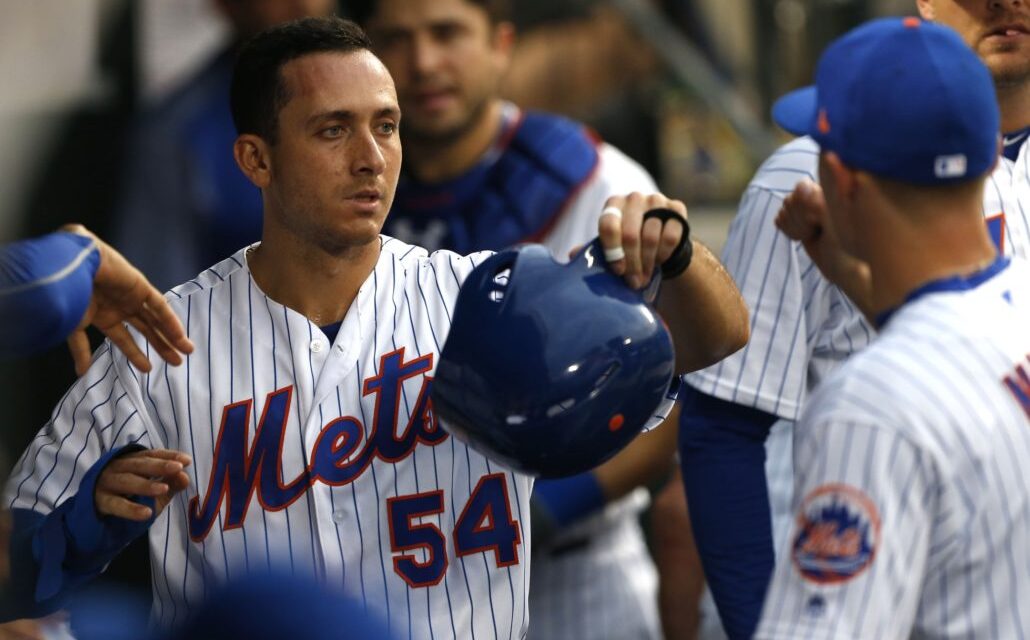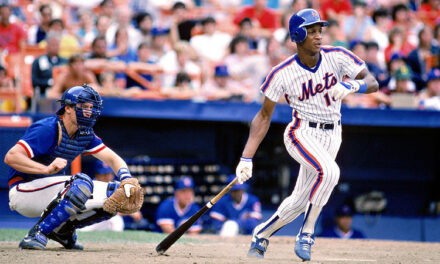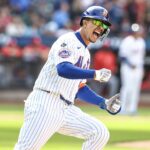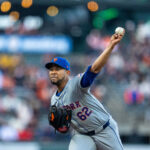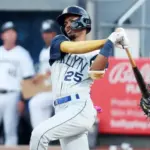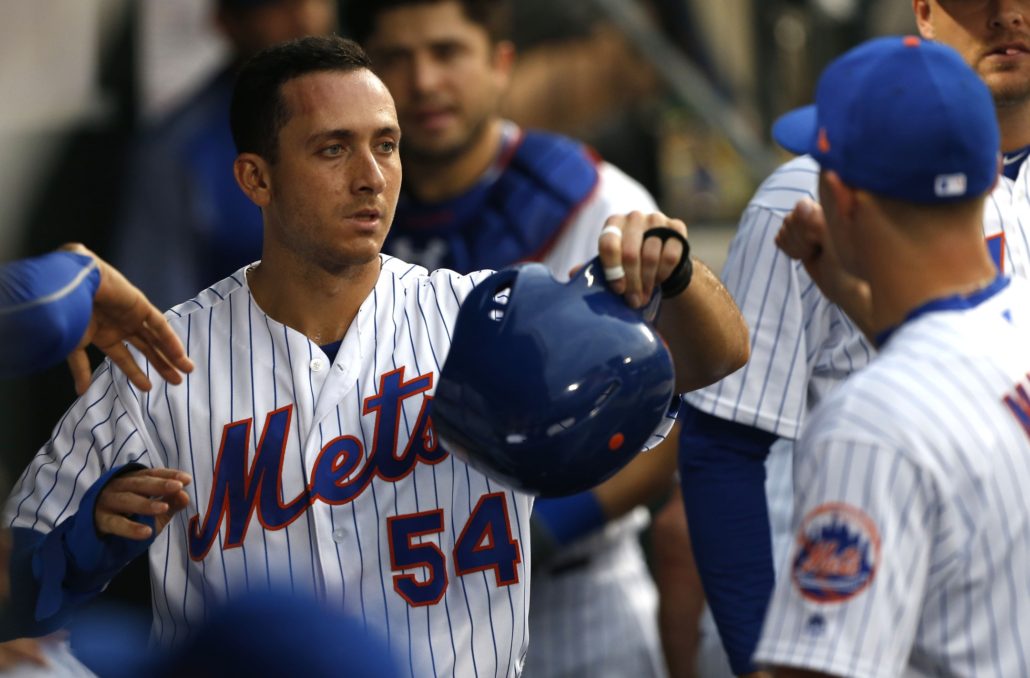
The story of T.J. Rivera is one of resilience and taking the opportunities given and making the most of them. After going undrafted as a college senior in 2011, the Bronx native was unsure of how he’d reach his dream of playing professional baseball.
Unbeknownst to Rivera at the time, his junior college coach and former Mets alum Mackey Sasser put in a good word for him with Mets scout Tommy Jackson. The Mets took a chance and signed Rivera shortly after the Draft, giving Rivera new hope for a dream he had since his childhood growing up in the Bronx emulating Derek Jeter.
Throughout his minor league ascension, Rivera hit under .300 just once (2013, .289) and routinely displayed his incredible ability to make contact and hit for a high average.
On August 10, 2016, Rivera made his major league debut after playing more than 550 games in the minors dating back to 2011. In front of dozens of family and friends, Rivera made his debut at Citi Field, batting sixth and playing third base against the Arizona Diamondbacks. Rivera recorded his first career hit (single to center) leading off the bottom of the tenth off right-hander Daniel Hudson in the Mets’ eventual 3-2 loss in twelve innings.
In 33 games in ’16, Rivera slashed .333/.345/.476 with a 120 OPS+ as the Mets surged in their last 40 games to make the postseason in back-to-back seasons for just the second time in franchise history.
Just a few short months after Rivera received his call up, here he was batting fifth and playing second base in the National League Wild Card game against the San Francisco Giants at home. A pitching duel ensued between Madison Bumgarner and Noah Syndergaard as the game remained scoreless until the top of the ninth when the Giants scored three runs off Jeurys Familia. Rivera was one of four Mets to record a hit off the lefty ace, and the only one to hit for extra bases.
Rivera showcased his versatility in 2017, playing double-digit games at first, second and third base. He once again showcased his high contact, low swing & miss rate, posting an 81.3 percent contact rate and 9.9 swinging strike percentage. Rivera’s 104 wRC+ was the 12th-highest mark among qualified National League rookies.
Unfortunately, Rivera played in just 73 games in ’17 after he was diagnosed with a partial tear of the ulnar collateral ligament in his right elbow in late July. After a little over a month of deliberations, Rivera chose to undergo Tommy John surgery and hoped that being a position player would minimize the time he was away from the diamond.
July 26, 2017, would be the last game Rivera would play in as a Met, as complications in his rehab led to his eventual release from the Mets during spring training in 2019.
Since his release, Rivera has bounced around baseball quite a bit. Rivera played for the Long Island Ducks of the independent Atlantic League in 2019, along with 15 games with the Washington Nationals’ Double-A affiliate that same season. He signed a minor-league pact with the Philadelphia Phillies for the 2020 season before he was released in late May and unable to play in any minor league games due to COVID-19.
After playing in Puerto Rico this offseason, Rivera is feeling healthy and ready for another opportunity. Rivera hopes that he can at least sign with an organization and give it another try of reaching the majors.
As he awaits a potential opportunity with a club, his main goal is simple: to go out on his own terms.
I had the privilege of speaking with Rivera earlier this year, where we discussed growing up in the Northeast, his time with the Mets and playing in the 2017 World Baseball Classic.
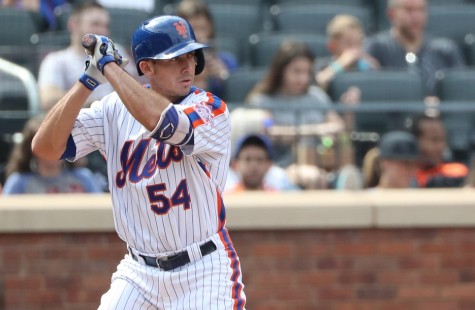
MMO: Who were some of your favorite players growing up?
Rivera: Growing up in the Bronx, I grew up a Yankees fan; my dad was the only Mets fan. I kind of stuck with [Derek] Jeter, he was my guy growing up. It was tough not to love him, he was just something else the way he conducted himself on the field and I guess off the field as well. He just handled the pressure so well and that was the guy I always looked up to.
I was a shortstop growing up as a kid, and he was just the man at the time. He was the guy I kind of tried to focus my game [after] and tried to play the way he did.
Another guy I really liked watching was A-Rod because his swing was my favorite as I got a little older and started understanding the swing a little bit. But [my] favorite player overall was definitely Jeter.
MMO: You grew up locally in the Bronx, where weather conditions weren’t always conducive to being able to play consistently. How did you continue to train and hone your craft despite the inability to play year-round like kids in warmer weather states?
Rivera: That’s a good question. I live down south now, and you can see how much easier it is to train and be outdoors a little bit earlier in the year and to get the work in. It’s more convenient being down here.
I guess you don’t know the difference as much when you’re growing up in the city and you don’t know anything different. I used my Little League field a bunch during the summers. My buddies that grew up in my building and all of my friends that played together would ride our bikes over to the Little League field that had a batting cage. If it was locked, we’d hop over the fence and get some work in.
As I got a little older, I started playing with some other teams that would rent out indoor facilities and gyms, really just gyms. I went to Lehman High School and we just used the gym; it had a cage that would pull out, some cones and some tees to hit off of and tennis balls. [Laughs.] We just got our work in. Then the summer came around [and] we’d be back outside on the fields.
I played a lot of Wiffle ball, too, so I don’t know if that had anything to do with my hand-eye coordination, but I played so much Wiffle ball.
It’s tougher, for sure, being up in the Northeast and not being able to be on the field. But you find a way to get your work in.
MMO: Mackey Sasser was your head coach in junior college, and he gave you a glowing recommendation to Mets scout Tommy Jackson. What kind of role did Sasser play in your development during your time at Wallace Community College?
Rivera: I was with Mackey for two years. It was a big change for me and a couple of other guys coming down south to see how things were done and see how ball was played down here and how they coached. It was a little bit of an adjustment period for us. Once we got used to everything, we were fortunate to have him as our coach because he had big-league experience.
The way he coached kind of let us go play and learn through our mistakes. I had Pete Coachman there as well, and they would tweak us, work with us here and there but they let us learn through our mistakes and let us go out there and grind it out and let us be ourselves on the field.
I had a lot of fun in my time with Mackey at Wallace. I think it was me and four other kids from New York that came down as well. We were on our own and we were working our butts off whenever we played. When practice was over we would try to sneak back over to the field because we lived right across the street and we had nothing else to do in the beginning; it wasn’t like we had friends and family around so we’d just sneak back onto the field and get our work in and hit in the cage when we could. But my time with him was great. He taught me a lot and I think I learned a lot about myself as well from those two years.
It’s funny, when I got signed by the Mets, I didn’t know how it even came about until my last couple of years with them. I never asked anybody, I just kind of went about my business. I don’t know if it was Tommy [Jackson] when I met him in person or who it was that told me, but I finally found out that Mackey was the one who recommended me. I thought the whole time it was my Troy coaches. I thought they called and put some good words in for me when I didn’t get drafted, and I finally found out my last couple of years with the Mets that it was Mackey that was the way I got the recommendation.
It’s funny that it took so long for me to find out that he was the one to do it, but I was definitely appreciative of it.
MMO: I certainly hope Mackey received a nice bottle of something after you found out it was him!
Rivera: I need to, I need to! We still talk here and there. I’m in Alabama now, so I’m like an hour and a half from them [Wallace]. I need to go stop by, but we always keep in touch.
I saw him when they had the Fantasy Camp in Port St. Lucie, he always does that. I’d see him a couple of times when he did that. And then he came and saw me in Atlanta when we were playing, so we always keep in touch.
He definitely helped me out and gave me that opportunity which I needed obviously, because there was no telling if I would’ve gotten an opportunity if not.
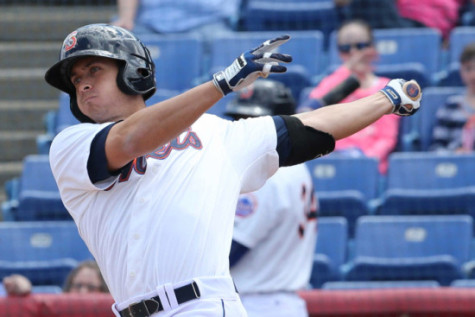
MMO: Can you talk about your memories of going undrafted but then having the Mets reach out and sign you just a few weeks later?
Rivera: It was a weird situation, it’s like the situation I’m in now trying to figure out what to do next and what’s the next move. It was a couple of weeks out of the Draft, and I was graduating – I had one class left – and I finished that. I was thinking, Man, what do we got? What’s my next move? What are we going to do here?
Then I got the call and I wouldn’t say it surprised me because I was going to try and do pro ball, I just didn’t know how it was going to come about. I got the call and I was really excited, first off. And then it was the Mets, too, and I remember Tommy asking if I played shortstop. I told him of course. I mean, if he would’ve asked me if I pitched, I would’ve told him yes. [Laughs.] I would’ve made something up and said of course I pitch. It hasn’t been since I was 12, but I’ve done it!
I just remember getting the call and just thinking, Man, this is crazy. This is going to be an opportunity, let’s hope it goes through and everything works. Being able to tell my parents that [I signed], obviously the goal was to be drafted, but things happen and you just got to keep moving forward.
When I got that call I was super excited. My wife, who was my girlfriend at the time, was a little let down because I was leaving her. But it all paid out and we all made some sacrifices. I was really excited to tell my parents that I was getting an opportunity.
MMO: As an undrafted player, what was your approach throughout the minor leagues? Did that put more pressure on you to succeed, or were you looking at it solely as an opportunity?
Rivera: I always thought I was the one with all of the pressure because I was this free agent. Looking back at it, I couldn’t fail. If I did fail and if I had one off season I probably was going home, and then I’d either have to restart or try to find another opportunity. That’s just the way it works, and I look back at it and I realize that now.
During the process, I looked at it as an opportunity. I looked at it like, man, this is an opportunity that I get and I’m going to take advantage of it with all my possibilities available. I’m just going to leave it out there. I’m going to do everything I can, I’m going to make sure I work harder than everybody else and I’m just going to make sure that when my opportunity comes [I’m ready].
I was obviously a bench guy and I wasn’t a guy that they were going to put out there – pretty much a roster filler – and I knew that. I knew that I was going to have to put a little more work in.
And then as the seasons started going along, I started realizing how important it was to be a high draft pick. That it meant a little something when you had money invested in you because then I moved quickly. I had a little halt in St. Lucie, and I realized that I’ve got to really keep proving myself.
So, yeah, I think there was a pressure that I knew if I had one off season that was probably it, you know? There are not many second opportunities for a guy that’s older than everybody else in the league and is a free agent and doesn’t have that much money invested. I had that pressure a little bit, but I also had the freedom of knowing that I’m just going to let it eat. I had the jersey on my back just like the other guys, and I’d be ready for that opportunity whenever it comes.
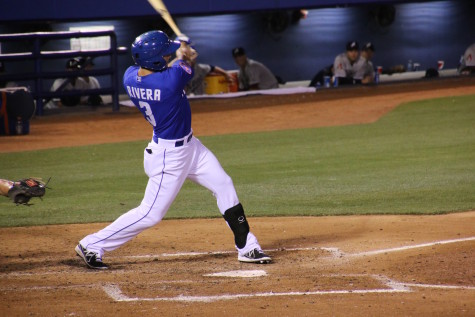
MMO: You were a high contact, high average player throughout your ascension through the minor leagues. Talk about what your approach was at the plate.
Rivera: I like to swing the bat, that’s just the truth about my approach. Sometimes it would be a negative I’m sure, like swinging out of the zone a little bit here and there. But I always felt like I had control when I was more aggressive, and I felt like I could do more damage when I was more aggressive.
I learned to just have the right mindset, I think, more than anything. I went from college where I put a little pressure on myself to get drafted, so I thought more of my batting average has to be good, the numbers have to be good. And I started learning as pro ball went along that it’s a long season and I’m just going to go up there with an obtainable goal of hitting the ball on the barrel, whether it be with one strike, no strikes, whatever it may be. My goal is to hit the ball on the barrel and hit it hard.
When I started learning to do that consistently, and not worrying about the numbers and what happens after I take my swing, that’s where my success started to kind of take off a little bit. Just being aggressive and the philosophy when I signed with them was, we were trying to find our pitch, so I was learning that as well. I think it was good timing for me to be with the Mets because I could’ve been a little too aggressive at times, and they were trying to make us less aggressive. That kind of helped me out with taking strikes and looking for a certain pitch, and I think that all kind of helped me focus and make my game a little better.
My approach has always been to barrel the ball up; it might not be pretty sometimes but that’s just the way I went about my business and just to compete. When I had that mentality of competing pitch-to-pitch, it goes a long way in a long season.
MMO: Early on in your professional career, you had current Mets manager Luis Rojas as your minor league manager. What were your impressions of Rojas back then?
Rivera: Man, I love Rojas. I’ve been saying that for years. I’m glad he’s got the opportunity up there and I think he’s going to be great. Great personality, an easy guy to play for, and I played well for him in the first half, so I know it’s a little easier when you’re playing well for a coach. But he’s not the type of guy that you have to play well for to feel comfortable with. He is just very even keel, very down-to-earth, very mellow, he’s an easy guy to play for.
I only played for him for half of that season in Savannah, but I loved him. I think he’s going to be great up there and I’m sure a lot of guys love playing for him. Never a guy to really be scared to talk to; I felt comfortable talking to him and comfortable being around him. You play for people sometimes and you’re a little hesitant around them because they’re the manager and the boss, but not with him, he was great to be around and very easy to play for.
I enjoyed my time with him and I hope he kills it up there. I think he will. I think he’s going to be a great manager for a long time.
MMO: What was the moment you heard you were getting the call to the majors like?
Rivera: I was in Triple-A and we had a doubleheader, and Wally Backman called me in. I was playing well at the time in Vegas. I played the first game and after he called me in and said, “I’m going to give you a rest.” And I’m like, okay. He told me that I had been playing my butt off and I just thought, Okay, I’m just not playing the second game. Cool, whatever. I’ll just relax.
And then he goes, “Oh yeah, by the way, you have a flight out at 12 tonight.”
I was like, oh gosh! It hit me really quick. You kind of think about those moments and you’re not sure when it’s going to happen or if it’s going to happen. You know you’re playing well and there are guys that go down up top and there’s a lot of movement happening, but you don’t know if you’re the guy or not. You try not to expect it, so I didn’t even think anything of it and then he hit me with that, and I just dropped. I was like, man, no way! And then to be able to call my parents and wife and finally tell them it’s all paid off; it’s not done but we’re a little further down the line in my goals and a lot of the things I was trying to achieve. It was such a great feeling, nothing like it.
It’s funny, because whenever Ty Kelly got his first call up, the day before we were in Colorado Springs and Frank Viola called me and goes, “T.J., Wally wants you.” And the whole team erupted! I remember going crazy and I’m thinking, Oh my God, is this about to happen? Am I getting my call up? I would never have thought anything like that but just because the team started screaming and just messing around with me, I was like, oh man, maybe this is it.
I got in there and Wally was just shaking his head and said, “You need a day off tomorrow.” He was just trying to see if I needed a rest. [Laughs.] And I was like, you’ve got to be kidding me, man. It was terrible. But I got the call up after that, but I just thought that was funny.
There was nothing like it, that feeling of calling your family and your loved ones and telling them you get to play in the big leagues.
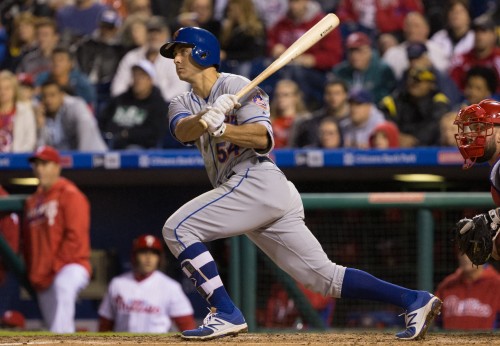
MMO: And then getting to make your major league debut at home and record your first career hit must’ve been a thrill.
Rivera: Nothing like it, man. To be able to do it at home in New York where I grew up and with all my friends and family there to support me was super cool. That made it that much more special to do it in New York because I know I had a lot of people that came to see me that night, and they’ve supported me for a long time, through my ups and downs.
There was a lot of support there and you don’t make it on your own without that support. For them to be able to experience that with me, yeah, there’s nothing like that. I’m very grateful for that moment and it was a relief to get that first one out of the way.
MMO: Fast forward just a few short months, and you’re batting fifth and the starting second baseman in the 2016 Wild Card game against Madison Bumgarner and the San Francisco Giants. You recorded the only extra-base hit (leadoff double in the fifth) off Bumgarner that game. What memories do you have from that contest?
Rivera: I got to play in the World Baseball Classic [in 2017], and that energy was great. The WBC and that moment in the Wild Card game, that energy was very similar. That energy that the stadium brought … I remember [Noah] Syndergaard striking Denard Span out [to start the game] and I’m playing second base and the crowd erupted. And I’m like, okay, this is it. That’s when it really hit me like we’re playing Wild Card playoff-type baseball and that was unbelievable.
I wish we would’ve come away with the victory because I think that would’ve been a fun ride. Madison Bumgarner was dealing and he’s a competitor, and that’s what you want. You want your best guy and their best guy and just go at it. Unfortunately, we didn’t come out on top in that game, but to experience that was cool. It was unbelievable.
I just remember that packed house and how loud it was after big plays; Grandy making that play out in the outfield and after every strikeout it felt like what I think a Game 7 of a playoff match would feel like. Everything is on the line and every pitch and every play means something.
Very, very grateful to be able to be a part of that moment and part of that team. It was unfortunate we didn’t get to come out on top, but it was definitely a great experience.
MMO: You mentioned playing in the World Baseball Classic in 2017, and the energy the fans brought. Can you talk about your memories from that WBC, in which Puerto Rico played in the championship game against the United States?
Rivera: That was really fun. The energy that those guys brought every time we played was just [great]. It’s tough to ever be a part of something like that again because there was just so much energy and Puerto Rico was behind us, just like every country was behind their team. There was just something about that energy of playing for something different other than yourself.
The whole dying our hair blonde and everybody in Puerto Rico doing the same thing, and just the support we were getting from everybody was so fun and so great. To just be around guys that are unbelievable athletes that you get to try and pick their brains or just watch them do their thing and be a part of it was fun.
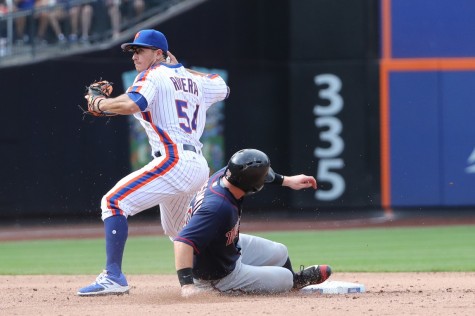
MMO: In the majors, you were versatile with where you could play. Was that something you did a lot growing up? And did you have a favorite position?
Rivera: Shortstop has always been my favorite. I played short pretty much until I got to high school and then I had to show my versatility a little bit because they had a starting shortstop on the varsity team. I played a lot of short and then I would play a little bit of third, and then I played a very little bit of first base when the first baseman pitched, but not much. I really stayed up on short and third, and mostly short, all the way through high school.
I started showing my versatility when I got to college because they had the same thing, they had a shortstop. I played short a little bit in the beginning and then I got moved to second and third base as well. I started moving around a little bit once I got to college. I think that kind of opened up some doors for me to be able to do so, to be able to stay in a lineup.
My favorite for sure is short. Even though I got moved out of there early in my career, I still love playing short. I just feel like you control the infield. I love that angle to attack the baseball, it’s definitely my favorite. First base has become one of my more favorite positions since I’ve played it more often. I enjoy trying to pick balls and I enjoy that position as well.
MMO: After the success you had in 2016, you put up another strong campaign in 2017 before undergoing Tommy John surgery that September. It was reported that you had some setbacks along your rehab, and ultimately, you were released in 2019. What were some of the struggles you encountered during that span?
Rivera: It was a long process, not the way I really pictured it. I thought it was I’m a position player getting Tommy John and I’ll be back in nine or ten months; that’s just the way you think of things when you hear about them. You hear people coming back really quick. But I just didn’t have that same normal rehab that everybody else does.
I felt good coming into spring, I came back a little earlier in my rehab games and never quite felt ready. I thought the pain was normal. I wasn’t sure what to feel so I thought it would go away and you just have to play through it. But I just never felt back to normal throughout that rehab and I had to shut it down there early in ’18, and then missed that whole year. I came into spring feeling great too.
I don’t know when I tweaked it but I know I was just taking a lot of throws at third and I just tweaked it again. I couldn’t figure out what was happening; it was sucky because I probably rushed myself a little bit too, trying to see opportunities in New York and I saw an opportunity to play. I was like, I’ve got to be there. And that was more my side rushing it a little bit and being stubborn.
Then I got to spring feeling great in ’19, and then it just gave out on me again. It feels great now but I didn’t know what was happening at the time. We tried everything, I was putting a brace on my arm just to try to be in the lineup and to play that spring because it was a new front office, new GM, everybody was new so I was trying to prove that I can play and show that I belonged. It was unfortunate that my arm was just not keeping up with me and I wasn’t able to show them that I belonged, and unfortunately I got released that spring training of ’19.
It’s been a long journey since, but you just got to keep rolling with it.
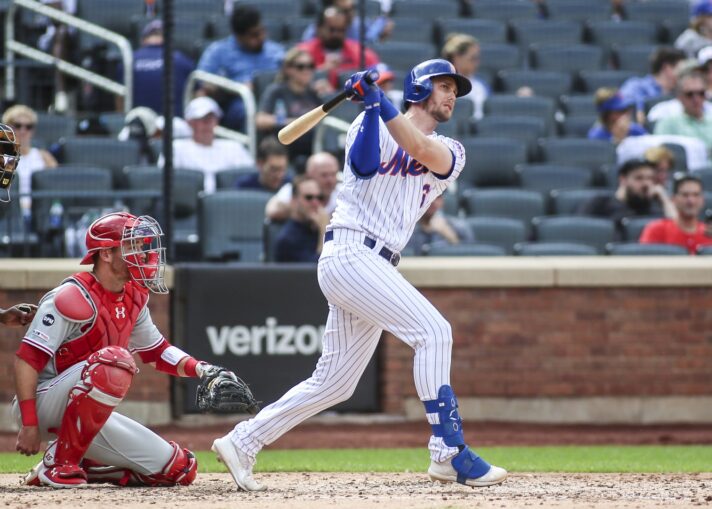
MMO: Whenever I think of your story, I always see similarities between you and Jeff McNeil. Two high-contact, high-average hitters who toiled in the minors for a while before getting an opportunity and thriving right away.
Rivera: His story is kind of cool too because he got hurt earlier in his career, and he had some setbacks I’m sure in his career. When he got his opportunity up there in New York he took off with it. And dang, he can swing it!
I never got to play with him, I was ahead of him a little bit because I was signed before him, so he was always a little bit behind me. But I always heard he could swing it. I watched him last year and the year before and I love the way he plays because he just puts the ball in play hard consistently. He’s all over that barrel.
I kind of had the similarity where we both like to put the ball in play, but I got hurt and I’m just hoping to get another opportunity to show that I can do similar things that he’s doing and go out and compete and just give it my all.
MMO: What does the future hold for T.J. Rivera?
Rivera: I don’t know. We are just waiting and seeing if teams are going to sign people for the minor league season. Hopefully everything goes smoothly and we do have a somewhat normal minor league season, I know it’s already been pushed back a little bit. It’s been a tough time to be out of the game or not with a team to try and get back in because you can’t really showcase yourself to get back to the big leagues when you’re not playing.
Last year, I thought it was going to be a great opportunity with the Phillies, but then we were all sent home and I was eventually let go from there. So I never really got an opportunity to show that I can still play. Right now, we’re just waiting to hear if teams are going to look to sign people for this minor league season and if I can be one of those guys.
I’m 32, but I hope my versatility and my experience in the past kind of opens up some doors for me and gives me an opportunity. That’s all I’m looking for, I’m not looking for anything crazy. I just want a chance to show I can still play at the high level and get an opportunity to get back to the big leagues. I can be okay with getting that opportunity and just not being good. If I’m not good then I can move on, but it’s tough to move on with no opportunity to show yourself and see what you still got.
I’m still fighting over here for an opportunity, just hoping somebody gives me that and to showcase my abilities and try to get back to where I feel like I can play and that’s the big leagues. If nothing works, out I’ll keep moving forward and stay in the game somehow and move on to some different avenues.
MMO: You did play recently in the offseason in Puerto Rico. How was the competition?
Rivera: It’s okay. This year it was a little weird because we only had four teams. There was one younger team that was just [comprised of] younger professional ballplayers, so they were just a bit younger and inexperienced and still growing. The other teams were just better and were all older and we had a lot of guys with MLB or Triple-A experience. But the other two teams were solid competition, and the team that beat us in the finals had a really good team.
It was some good competition and experience. All I was looking to do was I was just try to prove that I could still play. For me, the competition was not that important, it was just to show that I’m healthy, I’m playing and maybe somebody sees that and gives me a chance.
I’d say [the competition] wasn’t as good as it has been in the past because of the way things went; a couple of teams dropped out because of the whole situation with COVID and no fans. But there were two really good teams, our team and the other one that beat us were the two best and that was some good competition.
But like I said, it was an opportunity to get some at-bats and show that I’m healthy and playing which was fun.
MMO: Thanks for the time today, T.J. Best of luck to you.
Rivera: I appreciate it. Thank you.
Follow T.J. Rivera on Twitter, @TJ_Rivera_


